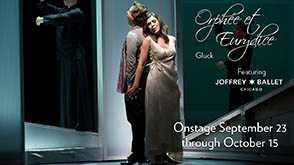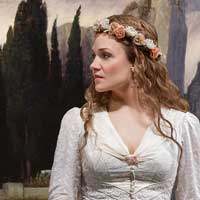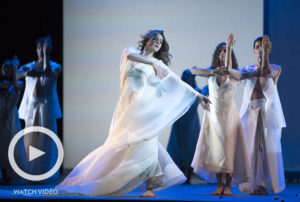
 [rating=5] At the turn of the last century, nearly every European who regarded themselves as a genius had a print from Arnold Böcklin’s Isle of the Dead series of paintings. Multiple late Romantic composers dedicated concert pieces to it, Lenin had a copy in his office, as did Freud, and August Strindberg ended his chamber play The Ghost Sonata with it engulfing the stage. Doing this linked intellectuals’ fascination with Böcklin’s symbolist painting with the camera obscura and the philosophical ponderings it and its technological descendants, photography, and film, inspired. In the new production of Christoph Willibald Gluck’s Orphée et Eurydice playing at the Lyric, a modern Orpheus joins the ranks of those philosophers by making a literal journey through the Isle and to the Underworld to impose his desires upon the powers of the unknown. The production, directed by John Neumeier and conducted by Harry Bicket, is a magnificent feat of artistry as chilling as it is astonishing for both the Lyric Opera and the Joffrey Ballet.
[rating=5] At the turn of the last century, nearly every European who regarded themselves as a genius had a print from Arnold Böcklin’s Isle of the Dead series of paintings. Multiple late Romantic composers dedicated concert pieces to it, Lenin had a copy in his office, as did Freud, and August Strindberg ended his chamber play The Ghost Sonata with it engulfing the stage. Doing this linked intellectuals’ fascination with Böcklin’s symbolist painting with the camera obscura and the philosophical ponderings it and its technological descendants, photography, and film, inspired. In the new production of Christoph Willibald Gluck’s Orphée et Eurydice playing at the Lyric, a modern Orpheus joins the ranks of those philosophers by making a literal journey through the Isle and to the Underworld to impose his desires upon the powers of the unknown. The production, directed by John Neumeier and conducted by Harry Bicket, is a magnificent feat of artistry as chilling as it is astonishing for both the Lyric Opera and the Joffrey Ballet.
This is the first time the Lyric and the Joffrey have worked together, although the Joffrey will be sharing the Civic Opera House with the Lyric after 2020. Their collaboration comes as the Lyric stages the 1774 French version of Orphée et Eurydice for the first time. This version, unlike the original Italian, features several dance sequences, making it the perfect opportunity to work with director-choreographer John Neumeier, who, true to Gluck’s desire to have all the elements of the production working in unity, is also the set, costume, and lighting designer. It also features the role of Orpheus as a tenor, here Dimitry Korchak, who is also working with the Lyric for the first time and instantly making himself invaluable.
Orpheus is a ballet choreographer who displays Isle of the Dead displayed in the rehearsal room, but when we first see him, his nose is buried in his concept book while his dancers work. Apparently, something isn’t clicking in his vision. He is angry when his wife, the dancer Eurydice (Andrea Churchman), is late and more concerned with her new headshots than the show he is evidently struggling with. They fight, she storms out, and later that night, she dies in a car crash. Orpheus is devastated: while singing “Ah! Dans ce bois tranquille” the forest spirits whirl around him in disorienting circles as he processes his sudden loss.
Here we see first see how Neumeier has blended his expressionist-inspired concept with Gluck’s neoclassical music. Orpheus’s arias are strophic, meaning they repeat the same music with each verse. Korchak has established that Orpheus’s character is fastidious and pedantic. After his aria “Object de mon amour,” it is very easy to imagine that Gluck’s simple, precise score is what Orpheus’s inner monologue sounds like, despite the symbolism of the painting he is attempting to adapt to movement and the reversed world he is about to enter. Korchak’s voice communicates this character trait as well as his body language; the music is challenging, but Orpheus is the master of all things elegant. Throughout the show, Orpheus sees doubles of himself and Eurydice (Temur Suluashvili and Victoria Jaini) dancing in a perfect harmony which noticeably contrasts with their stormy actual relationship. It’s a nice touch by Neumeier that Orpheus was apparently already sleeping in a twin bed.
Amour (Lauren Snouffer) offers Orpheus a chance to retrieve Eurydice, triggering the most visually impressive transformation sequence of the show, which is done with very simple elements. For once, it makes sense that Orpheus is not allowed to look at Eurydice, because the magic in this production literally runs on smoke and mirrors. The scene, which is clearly inspired by Jean Cocteu’s Orpheus, takes us through the rehearsal room looking glass, which reflects conductor Harry Bicket in the pit with the chorus, the Joffrey dancers as Furies and Cerberus, and Orpheus, who through tricks of lighting and forced perspective, looks like his own flat image on Böcklin’s painting. It’s marvelous but somewhat headache-inducing. The chorus’s “Quel est l’audacieux” and the erratic movements of the dancers are suitably unsettling for an Underworld that is more about psychological discomfort than bodily terror, and Korchak’s plea for order convincingly counters and overrides it.
Orphée et Eurydice has only three named roles, and of the three, Orpheus has by far the most singing to do. But at least Neumeier finds ways of keeping Snouffer and Churchman onstage most of the time, even though we don’t get to really hear Churchman until after the intermission. When we do, she is eloquent and passionate as she rides a swell of string underscoring. Gluck and his librettists realized a potential source of conflict is Eurydice’s weak motivation to leave the underworld, which Neumeier and Churchman make full use of. Although the opera was written at a time when stories were commonly changed to have happy endings, Neumeier finds something more complex and satisfying than that. The ending music, “L’Amour triomphe” sound determined, and then meditative. This emotional quality is a grand finale for a night of outstanding work for Bicket, as well as for the Joffrey dancers, whose bodies are in perfect tune with the voices coming from below the stage. Neumeier’s concept is a fascinatingly detailed portrait of an artist in a moment of creative and personal crisis. These mythological figures come to life in a manner which makes Gluck’s music seem like the perfect blending of their individual artistic and romantic qualities.
Orphée et Eurydice will continue at the Civic Opera House, 20 N Upper Wacker Drive, Chicago, thru October 15, with the following showtimes:
September 27 7:30 pm
October 1 2:00 pm
October 6 7:30 pm
October 9 7:30 pm
October 12 2:00 pm
October 15 2:00 pm
Running time is two and a half hours.
The Lyric offers parking deals with Poetry Garage at 201 W Madison St. if inquired about in advance. Tickets are $20-299; to order, visit LyricOpera.org or call 321-827-5600.
To see what others are saying, visit www.theatreinchicago.com, go to Review Round-Up and click at “Orphee et Eurydice.”







More Stories
“The Firebugs” reviewed by Julia W. Rath
“The Book of Grace” Al Bresloff with another from Paul LIsnek
“The Last Five Years” MILWAUKEE